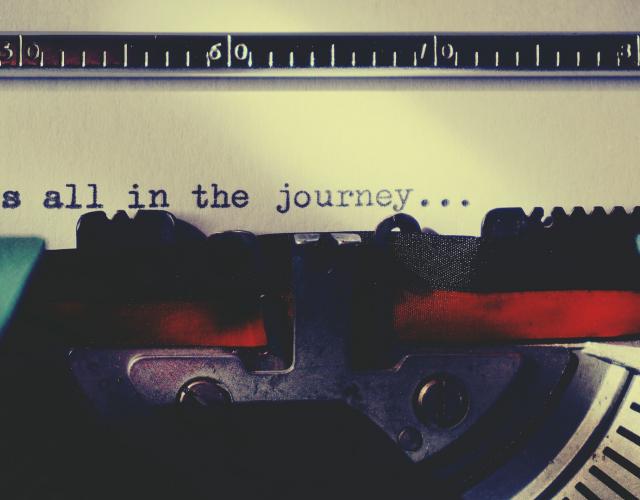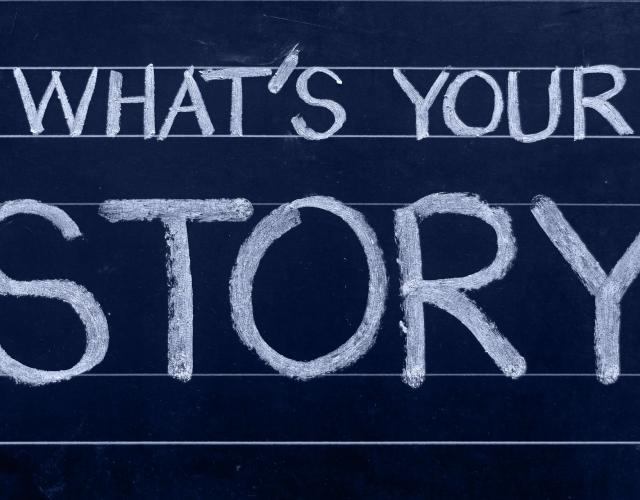A Caregiver Story: Tina & Vince
Surviving stroke and living in the aftermath is not reserved for the survivor alone.
For the millions of survivors living with aphasia and other impairments, there are millions of caregivers in the form of spouses, children, family & friends also in the wake.
Caregivers have a story of their own, yet parallel to their loved ones with aphasia. A story filled with fear, loss, anxiety, but also hope and determination. This past Aphasia Awareness month, I shared the story of Vince, a stroke survivor with aphasia. This month, we hear from Vince’s wife, Tena.
Tena was so kind to answer some questions reflecting on the past year and what she’s learned about life with aphasia since that fateful day Vince suffered his stroke in the early morning hours of July 22, 2019. He was not able to speak, but was eventually able to get Tena’s attention by making noises. She was able to call an ambulance, and Vince was eventually air-lifted to the hospital. Read on for her story in her own words.
A roller coaster of thankfulness & fear.
At what point after Vince's stroke did the realization that "OK, things are going to be different" first set in?
I knew from the moment of the stroke a devastating thing had happened. The first week I was just praying we could communicate and that he would understand me and that I would understand him. I knew from the beginning that things would be different...but how different? In the first few weeks, Vince was committed to getting better and going back to work. He is an optimist to his core. I had a much keener sense of what had been lost initially. I ride a roller coaster of thankfulness and fear. We know there will be enduring language losses now. We pray they are small. We have also seen tremendous gains and he continues to improve. Healing happens and gains are made that allow you to take back pieces of your life. But taking back life is like going home after a tornado. Things have been lost. You have hope but the picture in front of you remains blurry. Each month has a new set of unexpected joys/gains and also hard new truths. Some of our grief is intertwined and some personal.
How have you had to adjust your own communication style with Vince as you go through this process?
The biggest thing I had to learn was patience. The gift I give to Vince is time. Time to find his words, time to make himself known. I had to stop finishing his sentences for him or guessing words too quickly. He needs to talk and it takes time. I need to slow down and be quiet and look at him when he talks, not be distracted or try to multitask. He is doing a hard job and I need to enter it with him. I also have to mediate communication with others. People are quick to look to me to speak when we run into them. I need to slow the conversation and look to Vince so that he can speak. If I intentionally turn to him it creates space for him to speak. That is so important.
Speaking has also become more emotional. He sometimes speaks louder and can sound angry. I had to realize that his emotional level had more to do with the work of speaking than something directed at me. He has had to learn to mediate his emotions to slow down and to speak calmly and softer. It takes thinking first. I can help by not responding in frustration and by feeling what he is feeling.
Aphasia is present in all areas of life but it does not define our lives. Life is bigger than that. -Tena, wife & caregiver
It's fair to say that Vince's aphasia generated a sense of loss for you too. What's one thing that helps you to cope?
Far and away my faith brings meaning and if a hard thing has meaning you can do it – even with joy in the midst of pain. On a practical level having other family and friends lean in is a tremendous blessing. It could be a very isolating experience. Our kids and the rest of our family have been a bedrock in our lives. You need people to continue with you to do the hard work of finding a new normal with you. Our church community has been an incredible encouragement. The professionals that work with us have been a real life line back into the land of the living. We would not have recognized progress when it was happening without them.
Is there anything that is mostly "untouched" by aphasia?...life moments, a hobby, or routine you both share?
Words are pretty important in life but communication is bigger than words. Vince’s sense of humor is intact. It gets expressed a little differently but it is still so sharp maybe even sharper than it was. He still takes care of all our finances and has a much better memory for logistics than I do. He still leads our family and offers advice worth following and leads by example. He still has hobbies; he drives and is completely independent in most ways. We still share the same love for one another, probably at a deeper level than we ever have, our words are fewer but they carry so much weight and meaning when we say them. Aphasia is present in all areas of life but it does not define our lives. Life is bigger than that.
(Writer's Note: I edited some of Tena’s responses, but for length and clarity only. The words are her own).
Being a caregiver has challenges all its own. What challenges are you facing? Did Tena's story inspire you? Please share in the comments below.
Respond Speech Therapy
Comment Policy
We welcome relevant, respectful comments.
Please review our Comment Policy before commenting.
Terms and Conditions | Privacy Policy | Accessibility Statement
LSVT LOUD® is a trademark of LSVT Global, Inc., registered in the U.S. and other countries.
All Rights Reserved | Respond Speech Therapy | sitemap



